- Home
- Sigrid Undset
Happy Times in Norway Page 2
Happy Times in Norway Read online
Page 2
No one can understand how Tulla knows. Days and months do not exist in her little world—but nevertheless, she always knows when it is getting along toward a red-letter day in her life—her birthday, Christmas, and the Seventeenth of May. Now she knew Christmas was coming and every year before Christmas Mother had always taken her for a sleigh ride through town to see Main Street decorated with arches of fir and spruce boughs and with colored lights strung from one end to the other, the shops all aglitter with Christmas displays. But this year Tulla could not have her sleigh ride—and an automobile ride was not the same. Auto rides were for every day. And there was no use pointing out to Tulla that when there was no snow . . .
Tulla was angry, and all in vain was every effort of Mother and Thea and the boys to get her in good humor.
3
THE NIGHT BEFORE LITTLE CHRISTMAS EVE, THEA AND Mother worked in the kitchen until long after midnight. The headcheeses and the pigs’ feet had been stowed in the brine, the last cooky boxes were closed and carried up to the little storage closet, and Thea had set the sponge for bread and coffeecake. Now she had thrown open the window to rid the kitchen of its cooking smells.
“Does Madam see? I really think it is beginning to freeze.”
They went out on the stoop. The sky was black and filled with sparkling stars. They stepped down into the garden to feel the soil—yes, it was beginning to set. There was a crackling under their feet as they walked and Njord, who had slipped out with them, raced as if shot from a cannon, clear to the foot of the garden, to bark wildly at absolutely nothing out on the road, only to show that he was happy that winter had really come.
The hillside was white with frost next morning. Mother was going downtown to the market place, and Hans and Tulla were allowed to go along in the car. The market place was crowded with farmers selling wood, Christmas trees, and sheaves of grain. Hans was allowed to help Mother choose a Christmas tree and to pick out the handsomest sheaves of yellow, heavy-headed grain.
It is the custom in Norway to put a sheaf of grain outside the windows at Christmastime. Thousands of years ago the Stone Age people in Norway, when they had learned to grow grain, believed that the spirit that lived in the earth, and made things grow, fled when the grain was cut. It hid, they thought, in the last remaining stalks, and when these had been cut down, this spirit of growth was thought to be imprisoned in them. That was why the peasants laid aside the last sheaf and kept it. In midwinter, when the earth was frozen hard and covered with snow, and there was a frightening drumming at night from the ice on the sea, and trees cracked in the cold, and it was dark nearly all day—and daylight lasted only that short while from the time the sun, looking ill and feverishly red, crept up over the edge of the forest to hang low over the earth a short while, before dropping down to hide itself again—then the Stone Age people fetched this last sheaf of grain and hung it near the place they lived. The spirit in it helped the sun become strong again, and once more warm and light the earth to triumph over evil winter. Then the spirit returned to the thawing fields to bring the people a new harvest of blessed grain. . . .
From Asia came stories about powerful gods that ruled life on earth and the fate of men. The one who ruled over the heavens they called Ty, or Ull the Magnificent. One they spoke of only as the Lord—Fröy or Baldr—who ruled over the fertility of the earth and saw to it that animals and mankind had offspring. Sometimes he showed himself to people in the form of a boar with golden tusks and golden bristles. That was why swine came to be sacred and why people sacrificed swine to the god of fertility when at midwinter they tried to influence the powers that would bring back spring. Ever since it has been the custom in Norway to slaughter a pig for Christmas—and thus they do to this day.
But the best god of all was Thor. With that heavy hammer of his he slew trolls and evil things that wanted to wreck the settled countryside. Thor always heard the promises brides and bridegrooms gave each other, and all the bargains and agreements men made. Traitors, liars, and faithless ones could be sure that someday Thor’s revenge would smite them. His wife was Sif, with the golden hair that one sometimes saw flashing on the horizon just before Thor came driving in his chariot across the vaulted sky, as thunder boomed and the rain streamed. . . .
Thus, as though Norwegians still believed in gods and goddesses, they kept up the custom of hanging out the sheaf of grain for the midwinter feast. It could mean a sacrifice to the golden-haired Sif, and, besides, the old people had always done it and it had always helped to bring a good year.
There came a time when Norwegians sailed out in their ships along all the European coasts, plundering and burning and murdering wherever they went. But it happened—in England, in Ireland, and in France—that great kings rose up and succeeded in defending their countries from the pirates of the North. Many of the Vikings fell and Norwegians worried about the souls of those men who died in foreign lands and could not be buried in the mounds where their ancestors lay, on the old farms in Norway. Nor did they get the sacrifices and gifts that were supposed to assure them peace after death. The Saxons in Germany believed in a demon, Wotan the Terrible, who, when the storms howled at night and the clouds rolled across the sky, rode at the head of the train of these unhappy and homeless dead. The Vikings chose him to be their god and called him Odin, but only the warriors and chieftains worshiped him. The people at home, who struggled to win for themselves food from the earth and out of the sea, clung to Thor, the peasants’ god and protector.
Many young Norwegian princes set out as Vikings and came home Christians, eager to convert all the people to faith in the White Christ. The last of them, Olav Haraldson, succeeded. When he fell at Stiklestad in 1030, he had made Norway a Christian land, and he came to be remembered as Saint Olav.
But the Christian Norwegians kept up the custom of hanging out the Christmas sheaf. Only now they offered it as a gift to the little birds that ventured up to the houses when the snow was so deep in the mountains and in the forests that they could no longer find anything to eat. For Norwegian peasants, or farmers have always loved all living creatures. Christmas night they used to go out to the stable and give the horse and cows and goats and sheep an extra feeding: “Eat and drink, my good cow. Our Lord is born tonight.”
So from the earliest times we know anything about our country, even until the Germans came, overrunning and plundering it, a sheaf of grain has been set out for the little birds at every home at Christmas.
Mother always bought so many sheaves that one was set up in front of every window in the house. And when Tulla had got her sheaf set up, she forgot to be cross about the sleigh ride she did not get. She thought it great fun to sit and look at the birds come flying—the nimble yellowhammer, the fat and gluttonous greenfinch people had nicknamed “The Swede,” and the bullfinch with its black eyes and its breast as red as a rose in the snow.
4
IN NORWAY IT IS CHRISTMAS EVE THAT IS THE GREATest and the most sacred time in all the year. To Anders and Hans, Christmas Eve started in the morning, when the tree was carried into the large parlor where the fireplace was and Thea brought all the boxes of Christmas tree trimmings down from the attic. The boys became very busy wrapping up their presents and writing the names on the outside—getting their fingers and their jerseys inky—while Mother was downstairs trimming the tree. Every once in a while the boys found an excuse to slip down.
“Mother, how does Charlotte spell her name?”
Actually, what they wanted was to peep at the tree and see all the old things once more. The little porcelain angel, on the tip of the tree, which Grandfather and Grandmother had got from Grandfather’s parents in Trondheim when Mother was having her first Christmas tree and was only six months old. Every year some of the Christmas tree decorations broke and Mother added new ones—and Anders could remember which were the old, the older, and the oldest.
The last thing Thea baked was the special Christmas cookies. When they had come out of the oven and lay on
the table in rows, big and round and brown, dotted with raisins and candied lemon peel, coffee was served in the living room to the entire household, for on Christmas Eve dinner is always late. But Mother and Thea had to keep leaving the coffee table, for every once in a while someone came—the grocery boy with the latest purchases from the market, or boys from the greenhouses. For at Christmas friends and acquaintances all send flowers to one another, and soon so many bouquets and flowerpots—each containing several kinds of flowering plants—had come that it was hard to find room for them all. And each delivery boy had to have a gift. Anders had volunteered to keep an eye on the mailbox down the road and give the postman, when he turned up, the envelope with his Christmas gift in it.
“It’s much colder now,” Anders reported as he came in. “The air smells of snow.”
Christmas Eve dinner is at six o’clock and it is always rice porridge, boiled codfish, and red wine. At heart, the boys are not terrifically fond of either the rice porridge or that sour red wine. But that was what they had for Christmas Eve dinner in their home, because Mother’s father had always had porridge and boiled codfish in his home. In many places in Norway people have clung to the customs of Catholic times and fasted thus on Christmas Eve, even though it was four hundred years since the country became Protestant. But Christmas Eve is always festive, for everyone dresses for dinner or comes to the table dressed in his very best, and the electric lights are turned off everywhere in the house, for this night there must be only the living light of candles, and there must be a candle in every nook and cranny.
The table was decorated with flowers and candles stood in the old English-plate candlesticks, and on the table around these Thea had laid a garland of spruce fir sprigs and heads of grain. And with a lot of sugar and cinnamon on it, and a lump of butter in the middle, the rice porridge did not taste so bad after all. Besides, there was always one almond in it, and the one who found the almond in his porridge would have luck all year. Originally it was probably the custom that the one who found the almond in his porridge got an extra Christmas gift. But Grandfather had the idea that his children should be reared to feel greater joy in giving than in receiving, so he decided that whichever one of his little girls found the almond should be allowed to be the first to pass out her gifts. Mother said she could not remember that Grandfather’s beautiful thought was any too well received by herself and her sisters, so she decided that the almond should simply mean good luck in the new year.
And Tulla sat and was so happy that she laughed loudly all the time, and then everyone felt happy “for her little sake,” as Hans put it. Tulla liked rice porridge and even more she liked to watch the candle’s flames blaze and flutter when she blew on them. And it was Tulla who raised her head to listen, and said “ding-dong, ding-dong.” . . . Tulla was the first to hear the bells ringing Christmas in.
And now everyone took his glass of red wine and went out on the steps.
It was the church bells that were ringing and, as there was a light breeze, they could clearly hear the little bell in Vingrum chapel on the other side of the lake. The night was bright with stars and lights shone from all the windows in the neighborhood. All over the forested ridges, there were pinpoints of light where a farm lay. They stood awhile looking and listening—and then they all raised their glasses and wished one another “Merry Christmas.” Hans took his drop of red wine in one gulp, as if it were medicine, for it tasted sour to him, although he would not admit he did not like wine.
And now it was time for Mother to go down to the large parlor and light the Christmas tree. Then it was really Christmas. Astonishing, how it could seem just as solemnly wonderful year after year, Mother thought. In the big fireplace a large blaze of resinous pine knots cast a flickering red light across the pine-paneled walls that were smooth as silk to the touch and mellow with age, and brightened the gilded picture frames and the old brown bookbindings with the faded gold printing. The candles on the Christmas tree and the candles in the two old chandeliers that had once hung in a church were mirrored in the windows, where the night pressed blackly against the panes. There was the good odor of fir boughs and melted wax, of lily of the valley, and of hyacinth. Mother moved her chair close to Tulla’s, and Anders read the Christmas story for them. In the very middle he was interrupted by Neri, who began to whimper and whine to be taken on his lap. The pup was frightened by all these strange goings on. . . . Household pets dislike anything that upsets their routine. Both cats had left the house early in the afternoon; they did not like the look of things indoors. . . . And Neri continued to be restless. Only Njord sat quiet beside the basket of gifts, sniffing longingly at it. He remembered from previous Christmases that there was a package in it for him—a big sausage—and his nose told him it was there again this year.
There were not so many gifts in the Christmas basket this year. Those members of the family who were in Oslo and Stockholm wished to bring their gifts with them when they came up day after next, or Second Christmas Day. And Anders had got his new skis early, so that he could have them in readiness the moment there was some snow. Tulla’s fur coat and Swedish sleigh were not things to drag into the parlor. But the boys edged over toward the basket, eager to give out their gifts. Hans had bought three identical little figures of the Christ Child in the Manger for Mother and Thea and Tulla, and Anders distributed the results of a year’s manual training at school—a birdhouse, a shelf, and a green-painted stool. They were actually not bad, considering that Anders had made them. That boy usually was remarkably clumsy with his hands.
On the table stood the large copper bowl full of nuts and fruits and cookies—samples of all the seven different kinds that the people of Gudbrandsdal think they must bake for Christmas. And Mother poured mead into the old glasses. No one liked the sweet, sticky mead, but Christmas would not be really Christmas without it. At least it made the children sleepy. Tulla yawned as if she meant to swallow her entire family, and she followed meek as a lamb when Thea came to take her upstairs to bed. Hans curled up on the sofa and took a cat nap. Only Anders and Mother remained sitting by the fire, looking at the Christmas tree, where candle after candle burned down into its holder and went out and gave off the sweet, warm odor of melted wax and spruce fir. The fire on the hearth had sunk into red coals that crackled and softly sighed. Mother and Anders had always liked so much to sit together, without talking.
At ten o’clock came the car. It was always Böe himself who drove them to Midnight Mass. He said he was glad to take that job Christmas Eve for his parents lived down at Hamar, so while Mother and the boys were at church he could slip in and wish them a Merry Christmas.
Saint Thorfin’s Chapel at Hamar was only one large room in the Sisters’ Hospital. But tonight it beamed with light and flowers, and at the left of the main altar the Manger was set up—everyone from Hamar was certain that their Manger was the most beautiful Manger in all Norway, if not in all Christendom. Young fir trees filled the entire corner, making it a bit of a real Norwegian forest. Green moss and red whortleberry foliage formed the carpet that the Stable stood on and in this green moss blanket were planted white tulips and hyacinths and pink Christmas begonias. Every family in the parish had sent a flowering potted plant to the Manger for that night. The Stable was built of white birch logs and roofed with straw—Mother Fulgentia had used the excelsior in which the altar wines came packed, for Mother Fulgentia was clever that way. And in the light of the big star that hung over the roof of the Stable, the little figures of Mary and Joseph kneeling before the Manger, and the young and old shepherds and shepherdesses with their sheep and lambs that they were bringing to Mary, looked exactly as if they were real.
“He is real,” said little Aagot Larsen, who was kneeling beside Hans.
“Who is?” Hans whispered back, raptly interested.
“Jesus, of course. I saw him move his foot a little just now.”
“Yes, but did you see the ox shake his head?” Hans asked.
�
�Yes. Oh dear, just so he does not get mad and gore the Virgin Mary!”
“He doesn’t dare.”
Mother and Mrs. Larsen started to shush their children, but on the bench in front, where the nuns were kneeling, Mother Fulgentia turned around, a finger on her lips. She smiled a smile so bright that her eyes vied with all the Christmas candles, and the children smiled back at her and ceased their whispering.
But when Mass was finished, and while all those of the parish who had a long way to go were served tea in the sister’s parlor, Aagot and Hans outdid themselves telling each other all they had seen take place while Monseigneur said Mass. The Virgin Mary had spread the blanket over the child Jesus, but he had kicked it off again; the shepherds’ dogs had come up and sniffed around and Saint Joseph had patted them. . . .

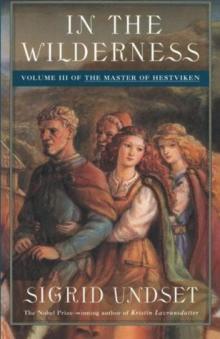 In the Wilderness
In the Wilderness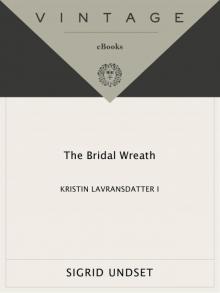 The Bridal Wreath
The Bridal Wreath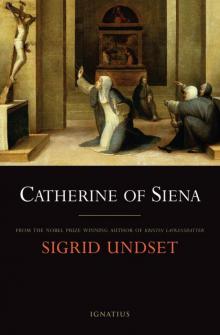 Catherine of Siena
Catherine of Siena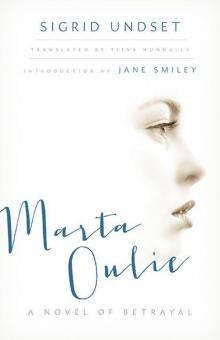 Marta Oulie: A Novel of Betrayal
Marta Oulie: A Novel of Betrayal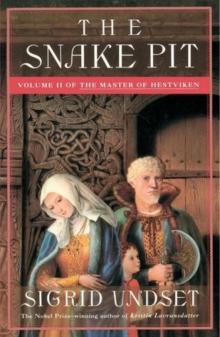 The Snake Pit
The Snake Pit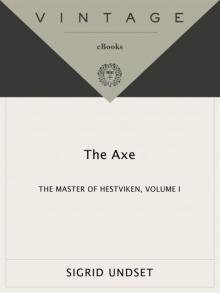 The Axe
The Axe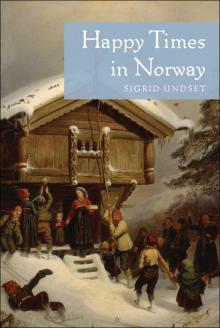 Happy Times in Norway
Happy Times in Norway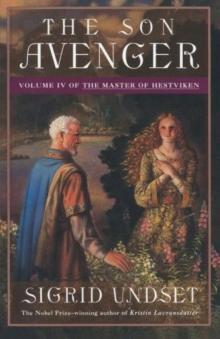 The Son Avenger
The Son Avenger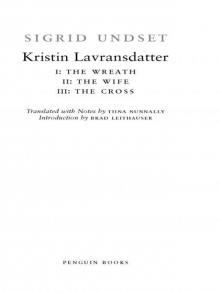 Kristin Lavransdatter
Kristin Lavransdatter